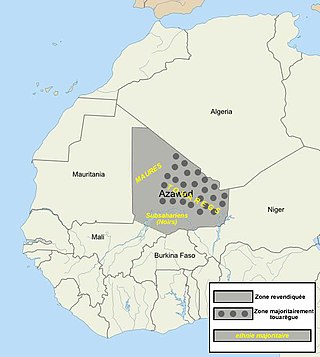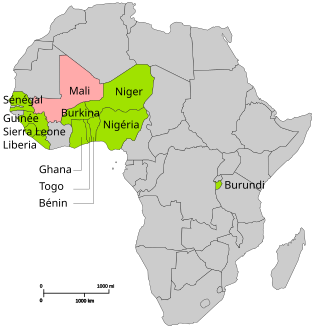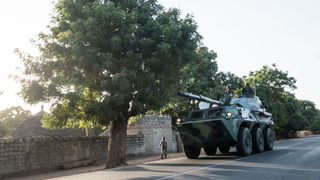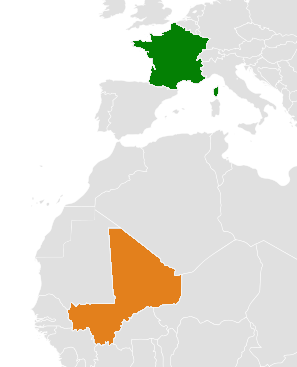
The Malian Armed Forces consists of the Army, Republic of Mali Air Force, and National Guard. They number some 7,000 and are under the control of the Minister of Armed Forces and Veterans. The Library of Congress as of January 2005 stated that "[t]he military is underpaid, poorly equipped, and in need of rationalization. Its organisation has suffered from the incorporation of Tuareg irregular forces into the regular military following a 1992 agreement between the government and Tuareg rebel forces."

The United Nations Mission in Liberia (UNMIL) was a United Nations peacekeeping operation established in September 2003 to monitor a ceasefire agreement in Liberia following the resignation of President Charles Taylor and the conclusion of the Second Liberian Civil War (1999–2003). At its peak it consisted of up to 15,000 UN military personnel and 1,115 police officers, along with civilian political advisors and aid workers.

The African Standby Force (ASF) is an international, continental African, and multidisciplinary peacekeeping force with military, police and civilian contingents that acts under the direction of the African Union. The ASF is to be deployed in times of crisis in Africa. Addis Ababa, Ethiopia, serves as the Force's Headquarters. Douala, Cameroon, was selected in 2011 as the site of the AU's Continental Logistics Base (LOGBASE).
The international reactions to the 2011 military intervention in Libya were the responses to the military intervention in Libya by NATO and allied forces to impose a no-fly zone. The intervention was authorized by United Nations Security Council Resolution 1973, approved in New York on 17 March, in response to the Libyan Civil War, though some governments allege participants in the operation exceeded their mandate.

The 2012 Tuareg rebellion was the early phase of the Mali War; from January to April 2012, a war was waged against the Malian government by rebels with the goal of attaining independence for the northern region of Mali, known as Azawad. It was led by the National Movement for the Liberation of Azawad (MNLA) and was part of a series of insurgencies by traditionally nomadic Tuaregs which date back at least to 1916. The MNLA was formed by former insurgents and a significant number of heavily armed Tuaregs who fought in the Libyan Civil War.
The Movement for Oneness and Jihad in West Africa or the Movement for Unity and Jihad in West Africa, was a militant Islamist organisation that broke off from Al-Qaeda in the Islamic Maghreb with the intended goal of spreading jihad across a larger section of West Africa, as well as demanding the expulsion of all French interests that operate in West Africa, which they regard as "colonialist occupiers".

The 2012 Malian coup d'état began on 21 March that year, when mutinying Malian soldiers, displeased with the management of the Tuareg rebellion, attacked several locations in the capital Bamako, including the presidential palace, state television, and military barracks. The soldiers, who said they had formed the National Committee for the Restoration of Democracy and State, declared the following day that they had overthrown the government of Amadou Toumani Touré, forcing him into hiding. The coup was followed by "unanimous" international condemnation, harsh sanctions by Mali's neighbors, and the swift loss of northern Mali to Tuareg forces, leading Reuters to describe the coup as "a spectacular own-goal". On 6 April, the junta agreed with Economic Community of West African States (ECOWAS) negotiators that they would step down from power in return for the end of sanctions, giving power to a transitional government led by parliament speaker Dioncounda Traoré. In the following days, both Touré and coup leader Amadou Sanogo formally resigned; however, as of 16 May, the junta was still "widely thought to have maintained overall control". On 3 December 2013, a mass grave was discovered in Diago holding the remains of 21 soldiers that went missing the year before, loyal to the ousted president.

On 6 April 2012, the National Movement for the Liberation of Azawad unilaterally declared Azawad independent from the Republic of Mali in the wake of a rebellion which was preceded by a string of other Tuareg rebellions. It is called the Independent State of Azawad.

The Mali War is an ongoing conflict that started in January 2012 between the northern and southern parts of Mali in Africa. On 16 January 2012, several insurgent groups began fighting a campaign against the Malian government for independence or greater autonomy for northern Mali, which they called Azawad. The National Movement for the Liberation of Azawad (MNLA), an organization fighting to make this area of Mali an independent homeland for the Tuareg people, had taken control of the region by April 2012.

United Nations Security Council Resolution 2071 was unanimously adopted on 12 October 2012. It related to the 2012 Northern Mali conflict and mandated that an actionable plan for military intervention be made by ECOWAS and the African Union within 45 days.

Django Sissoko was a Malian civil servant who was Prime Minister of Mali from December 2012 to September 2013. He was Minister of Justice from 1984 to 1988 and subsequently served twice as Secretary-General of the Presidency, from 1988 to 1991 and from 2008 to 2011. He also served as Ombudsman from 2011 to 2012.

Operation Serval was a French military operation in Mali. The aim of the operation was to oust Islamic militants from the north of Mali, who had begun a push into the center of Mali.

The African-led International Support Mission to Mali (AFISMA) was an Economic Community of West African States (ECOWAS) organized military mission sent to support the government of ECOWAS member nation Mali against Islamist rebels in the Northern Mali conflict. The mission was authorized with UN Security Council Resolution 2085, passed on 20 December 2012, which "authorizes the deployment of an African-led International Support Mission in Mali (AFISMA) for an initial period of one year. The AFISMA mission transferred its authority to MINUSMA on 1 July 2013, that is, AFISMA mission ended and MINUSMA mission began, with AFISMA troops becoming MINUSMA troops.

The following is a timeline of major events during the Northern Mali conflict.

The United Nations Multidimensional Integrated Stabilization Mission in Mali was a United Nations peacekeeping mission in Mali. MINUSMA was established on 25 April 2013 by United Nations Security Council Resolution 2100 to stabilise the country after the Tuareg rebellion of 2012, and was terminated over a decade later on 30 June 2023. Officially deployed on 1 July 2013, MINUSMA was the UN's deadliest peacekeeping mission. While UNIFIL, the mission in Lebanon, has lost more peacekeepers overall, by incident type the majority of those deaths at 135 are officially listed as "accidents." At 175 deaths by "malicious act," MINUSMA was officially the deadliest Peacekeeping mission of all time.

The ECOWAS military intervention in the Gambia or the ECOWAS Mission in The Gambia – initially code-named Operation Restore Democracy – is a military intervention in The Gambia by several member states of the Economic Community of West African States.

United Nations Security Council Resolution 2337 was a measure unanimously adopted by the United Nations Security Council (UNSC) on 19 January 2017. It expressed support for efforts by ECOWAS to peacefully resolve the 2016–2017 Gambian constitutional crisis, calling on President Yahya Jammeh to step down and allow a peaceful transition to the President-elect, Adama Barrow, as well as supporting the African Union and ECOWAS decisions in recognizing Adama Barrow as the new president. The measure was adopted by a vote of 15 supporting, none opposed, and none abstained.

France–Mali relations are the current and historical relations between France and Mali.

On 18 August 2020, elements of the Malian Armed Forces began a mutiny, and subsequently undertook a coup d'état. Soldiers on pick-up trucks stormed the Soundiata military base in the town of Kati, where gunfire was exchanged before weapons were distributed from the armory and senior officers arrested. Tanks and armoured vehicles were seen on the town's streets, as well as military trucks heading for the capital, Bamako. The soldiers detained several government officials including President Ibrahim Boubacar Keïta, who resigned and dissolved the government. This was the country's second coup in less than 10 years, following the 2012 coup d'état. On a subregional level, the coup also marked an end to a period of nearly six years, since the 2014 Burkina Faso uprising and the ousting of Burkina Faso's President Blaise Compaoré, during which there was not a single undemocratic change of government in West Africa. For this subregion, where many countries have a history of civil war and violent conflict, this was a period of remarkable stability, during which ECOWAS even managed to find a peaceful resolution to the 2016–2017 Gambian constitutional crisis.















